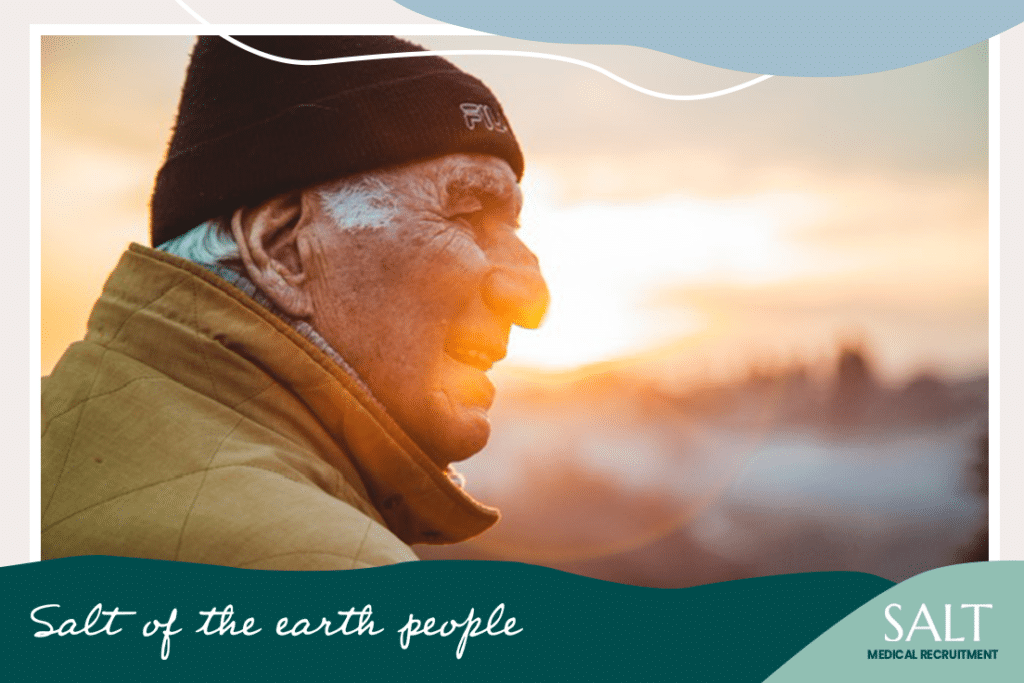Ever imagined retiring early, packing your bags, and driving off into the Australian wilderness in a campervan?
Yep, us too. Sign us up.
More and more Australians are choosing to down tools and live on the road, travelling across rural and remote Australia seeking life- and health- enhancing experiences, AKA living the dream. Heading off into the sunset in campervans or motorhomes for weeks, months or years at a time, these ‘grey nomads’ already account for 28% of the domestic tourism population in Australia – and with overseas travel restrictions remaining in place thanks to the pandemic, this figure is likely to continue rising year on year.
But, while the grey nomad lifestyle sounds appealing to many, is it putting too much strain on an already over-burdened rural healthcare system?
What is a ‘grey nomad’?
A grey nomad is someone aged 55 or over who travels around rural and remote Australia in a caravan or motorhome, usually for extended periods of time. Most are heterosexual white Anglo-Australian couples, retired from the workforce and keen to experience more.
Essentially, grey nomads are Australians who choose to spend their retirement years travelling around the country, visiting ‘home’ sporadically, but mostly staying on the road for months or years at a time. In fact, estimates suggest that 20% of grey nomads live the nomadic travelling lifestyle for more than 2 years.
Grey nomads aren’t just vacation travelers. They see this adventure as a way of life, a reward to themselves after a working life contributing to social and economic systems. They seek privacy, isolation, self-sufficiency, closeness with nature – all the things they probably weren’t able to enjoy during their working years.
They may only form 2% of the Australian population, but with overseas travel restrictions likely to stay in place for the foreseeable future, the grey nomad phenomenon isn’t going anywhere anytime soon!

The impact of grey nomads on Australia
The grey nomad lifestyle sounds hugely appealing, but what impact is an increasingly large transient (and ageing) population having on Australia?
Well, there’s good news and bad news.
The good news is that grey nomads are helping to boost many rural and regional communities economically. By travelling to out-of-the-way places and living a nomadic lifestyle, grey nomads are spreading their economic power further than traditional retirees do.
While figures are difficult to find, given the off-the-grid nature of the grey nomad community, some estimates suggest that grey nomads travelling the country in RVs spend an average of $770 per week in the rural and remote areas they visit – which isn’t a small amount, considering that, according to Tourism Research Australia, there are an estimated 30-40,000 grey nomads living on the road each quarter.
With more economic power than younger generations, grey nomads are sharing their wealth liberally across the country, rather than concentrating their spending in a single fixed area. All of which is positive for rural and remote communities who are often more likely to struggle during times of economic uncertainty.
However, the grey nomad trend isn’t without its problems. Particularly when it comes to Australian healthcare…
Grey nomads and rural healthcare in Australia
It goes without saying that, generally speaking, the older we get, the more healthcare support we need. So, for grey nomads, who by definition are 55 years or older, needing medical support on the road is not an uncommon occurrence.
And this is where the grey nomad lifestyle starts to become potentially problematic…
We’ve repeatedly seen rural and remote healthcare services face unique challenges when compared to services in metropolitan areas. Whether it’s workforce shortages or workforce distribution issues, logistics and supply chain issues or recruitment and retention issues, rural healthcare providers face a barrage of daily challenges when it comes to providing high-level healthcare services to the populations they serve.
Add on to that an increase in transient patients, and you can already see how grey nomads might be putting extra strain on an already-strained system.
According to Rural and Remote Health, most grey nomads are travelling with at least one chronic health condition – whether it’s diabetes or heart issues, or just reliance on repeat medications, most grey nomads require some level of ongoing health support.
When asked, most of these nomads wouldn’t consider that their health conditions would affect their travels – but when many grey nomads are on the road for months or years at a time, the likelihood of them needing medical attention during their travels is high – and many don’t adequately prepare for this possibility.

Accessing healthcare on the road
The first issue many grey nomads face while travelling is how to actually access healthcare services in rural or remote areas.
With rural healthcare providers having a reduced or limited range of services on offer (diminished workforces and the facilities can play a big part here!), compared to their metropolitan counterparts, it may prove challenging to access the care a grey nomad may need.
And that challenge has seen an increase in reliance on rural pharmacies instead. Many grey nomads, instead of heading to a healthcare centre or hospital, will use pharmacies as their first port of call – simply because it’s easier to access. But these pharmacies are not only stretched already, but they often don’t have the expertise to handle specific medical conditions.
In metropolitan areas, Australians are accustomed to a decent quality of medical support – whether that’s being able to get appointments quickly or having easy access to repeat prescription medication, it’s a simple and fairly straightforward process for many. But on the road, in rural and remote areas, things aren’t quite so simple – and many grey nomads don’t factor that into their travel plans!
Fragmentation of healthcare quality
Another issue facing grey nomads and their health while travelling across Australia is the fragmentation of their care.
When living in one place, you’ll likely see a team of healthcare professionals who know your history, are familiar with your situation and can provide you with holistic healthcare support.
When on the road, things aren’t so simple. Grey nomads are unlikely to remain in a single place long enough to build or sustain the same kinds of relationships with healthcare providers, which opens up the risk of healthcare support being more sporadic, less tailored to the individual’s health history, and potentially less effective.
Obviously, every healthcare provider will take into account a patient’s history – but the impact of having a long-term relationship with an individual provider who intimately understands a patient’s needs shouldn’t be underestimated!

Grey nomads during the COVID-19 pandemic
We all know the impact COVID-19 has had on the healthcare system in Australia (and across the world, for that matter). Increased pressures, decreased resources and a whole host of logistical issues have faced almost every healthcare provider in the country.
But for grey nomads, who primarily rely on already-struggling remote healthcare providers, the issue has been exacerbated – forcing many to turn to digital healthcare instead.
While anecdotal evidence would suggest the uptake is reluctant, grey nomads seem to be taking advantage of digital healthcare, including virtual consultations, telemedicine services and using the internet to seek medical support.
Technology is facilitating many to take control of their own health and find support and answers without needing to rely on local healthcare providers – but there are many who doubt its efficacy, and it can never completely eradicate the need for face-to-face medical support.
The future of grey nomads and healthcare
So, what does the future hold for grey nomads?
One thing is clear: the grey nomad trend is on the rise and is likely to continue rising – particularly while overseas travel remains difficult.
For rural healthcare providers, this means the struggle might not be ending anytime soon… Grey nomads will continue to put an added strain on rural and remote communities, despite bringing a positive economic impact.
We believe we will also continue to see the use of digital healthcare increase well into the future. COVID-19 has at least been a positive catalyst for change on this front. Accessing healthcare ‘in your pocket’ not only helps grey nomads to take control of their health while travelling across the country, but it also reduces the need for face-to-face contact when it’s not always accessible.
Digital healthcare does have its limitations and it is impossible in scenarios such as heart attacks and hips replacements, for grey nomads to rely solely on digital healthcare whilst travelling. Virtual consultations can only go so far and relying on social media or online sources of healthcare information is both challenging (in that there’s an awful lot of conflicting information out there to sort through!) and risky (because, unless you have medical training yourself, how can you tell what the ‘right’ advice is?!).
While the appeal of dropping everything and living off-grid for a couple of years is strong, we’d urge anyone considering the grey nomad lifestyle to think about the healthcare implications beforehand! Particularly if you’re living with ongoing chronic health issues. It’s not as easy as you might think to access effective healthcare support while on the road – and the impact you have on rural and remote communities can be huge.

Rural and remote Australia is always on the lookout for great doctors (just like you!) interested in providing quality care. So, if you fancy experiencing all the beautiful natural wonders that Australia has to offer, a locum role in a unique rural or remote location good be perfect for you!
Please head over here to see what we’re recruiting for at the moment and find your perfect off-grid opportunity.



















